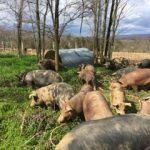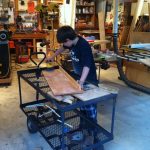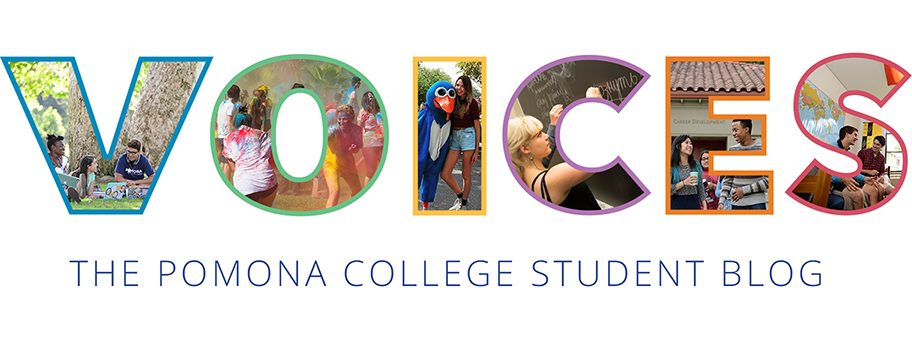By Max Ober ‘22
No one’s story at Pomona is the same. Hailing from across the country and across the world, we’re a really diverse group of students that have in common a desire to enrich our education and broaden our horizons. I absolutely love hearing other people’s stories, their backgrounds, and what brought them here. My story fits in among some of the weirder, niche backgrounds.
 Born in Washington, D.C., I moved to West Virginia when I was three years old. I lived on a pig farm in the Eastern Panhandle of the state until the day I came to Pomona, making me one of two Pomona students from West Virginia. Unsurprisingly, there are very few Pomona students who have grown up on a farm. In fact, I don’t know if I’ve ever met one. No doubt they exist, but rural and farm kids are few and far between at the Claremont Colleges. Claremont is a world away from the tiny West Virginia county where I grew up and, for a lot of rural students, the change can be intimidating.
Born in Washington, D.C., I moved to West Virginia when I was three years old. I lived on a pig farm in the Eastern Panhandle of the state until the day I came to Pomona, making me one of two Pomona students from West Virginia. Unsurprisingly, there are very few Pomona students who have grown up on a farm. In fact, I don’t know if I’ve ever met one. No doubt they exist, but rural and farm kids are few and far between at the Claremont Colleges. Claremont is a world away from the tiny West Virginia county where I grew up and, for a lot of rural students, the change can be intimidating.
 I want to encourage rural students to apply to Pomona because of the incredible support and resources here. The education I have received so far, only a year in, has been incredible. Many students in rural areas attend underfunded schools, especially in states that struggle such as West Virginia. Education funding is abysmal in West Virginia, from the teachers down to the buildings. During my senior year, West Virginia teachers started a strike for higher pay and better benefits that had a ripple effect across the country, even here in Los Angeles. During my junior year, my high school couldn’t afford to pay AP teachers to get training for their courses, so the district outsourced our education to objectively bad online courses in AP U.S. History and English Language. Additionally, my school ran out of paper on multiple occasions due to lack of education funding in the district, forcing teachers to reach into their own pockets. Despite these obstacles, I enjoyed making the most out of my high school experience and taking the setbacks in stride. Pomona, however, ushered in a new era of education and learning for me.
I want to encourage rural students to apply to Pomona because of the incredible support and resources here. The education I have received so far, only a year in, has been incredible. Many students in rural areas attend underfunded schools, especially in states that struggle such as West Virginia. Education funding is abysmal in West Virginia, from the teachers down to the buildings. During my senior year, West Virginia teachers started a strike for higher pay and better benefits that had a ripple effect across the country, even here in Los Angeles. During my junior year, my high school couldn’t afford to pay AP teachers to get training for their courses, so the district outsourced our education to objectively bad online courses in AP U.S. History and English Language. Additionally, my school ran out of paper on multiple occasions due to lack of education funding in the district, forcing teachers to reach into their own pockets. Despite these obstacles, I enjoyed making the most out of my high school experience and taking the setbacks in stride. Pomona, however, ushered in a new era of education and learning for me.
I have never been around such inspiring, thoughtful, and caring individuals in my life, and my fears about being underprepared for this school’s rigor were allayed by the supportive professors, numerous academic resources, and fascinating classes. Specifically, the academic resources at Pomona are designed to provide reinforcement to what students learn in class and are available any time a concept or lesson is unclear. As an International Relations major, I have experienced this through the Oldenborg Center for Modern Languages, the Foreign Language Resource Center (FLRC), mentor sessions, and writing partners. I take Spanish and French, so having multiple tools of institutional support for language learning and writing is invaluable. Oldenborg hosts language tables every weekday for lunch, where there is an explicit ban on speaking English. Additionally, Oldenborg has conversation classes; for one hour twice a week, students can take a quarter-credit class presided over by a language resident. The class is informal, without homework, and is a comfortable place for students to converse and share stories with peers in a target language. The FLRC has tutoring sessions, movie showings, drop-in hours, and various other resources that I just discovered while writing this blog. That’s a far cry from Jefferson High’s “Bring your tractor to school” day.
Since my high school never offered economics classes, I was terrified when I registered for macroeconomics. At Pomona, however, classes with problem sets, typically STEM classes, always have mentor sessions attached to them. Mentor sessions, held once a week, give students the opportunity to work on problem sets with each other and, more importantly, the help of student mentors who’ve already taken the class and excelled. Not only does this make the problem sets easier, but allows for additional review of concepts and insights from the mentors.
I could never have imagined this kind of support in high school. In fact, I distinctly remember the pit in my stomach during Orientation Adventure as I heard about prestigious high schools with opportunities galore, glamorous field trips (particularly those that went abroad), and Socratic classrooms. Some schools had Model UN; we had Future Farmers of America. Looking back now though, none of that matters. Pomona, as hard as it may be at times, genuinely desires to see its students succeed and learn, regardless of your high school background. Taking advantage of institutional resources is a pillar of collegiate success, and I’m truly grateful for Pomona’s. Just as cornfields became palm trees for me, my entire relationship with education was turned on its head.

